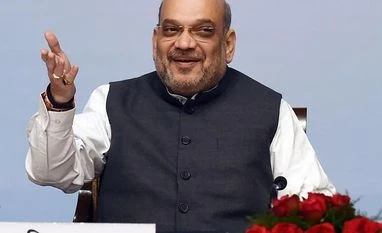Urging all SCO countries towards joint assistance in dealing with earthquakes, Home Minister Amit Shah on Monday said India would soon come up with a national scheme which would not only cover the disaster risk renewal Sendai Framework but also the goals of permanent development and climate related agreement.
Speaking at the Joint Exercise on Urban Earthquake Search and Rescue 2019 in Delhi, Shah said India has completed the amendment process in the country's National Disaster Management Scheme launched in 2016.
Noting that all 28 states, nine Union Territories and 90 per cent districts have completed their disaster management schemes, Shah said: "We will now come up with such a national scheme which not only would cover disaster risk renewal Sendai framework but also the goals of permanent development and climate related agreement."
Sendai Framework is a 15-year, voluntary, non-binding agreement which recognizes that the state has the primary role in reducing disaster risk but that responsibility should be shared with other stakeholders, including local government, the private sector and other stakeholders.
Talking about earthquakes being a major problem, the Home Minister said about three lakh people were killed between 1996 and 2015 due to natural disasters in all the eight Sanghai Cooperation Organisation (SCO) countries that include India, Russia, China, Pakistan, Kazakhstan, Kyrgyzstan, Tajikistan and Uzbekistan.
Of them, Shah said two lakh people died due to earthquakes - two-thirds of the overall death reported in SCO countries due to natural disasters.
"So, it is a challenging and important task for the SCO countries to deal with the danger of earthquake. In this context, the joint exercise would be very useful in our joint preparedness to deal in urban earthquake, search and rescue action," Shah said.
More From This Section
The four-day exercise, beginning from Monday, would help the SCO countries in a situation when they need the support of others to deal with any disaster-like situation, the Minister said.
Shah also said that with approximately 40 per cent of the global population living in the SCO countries, the region currently includes the world's fastest growing economies.
"If we manage to prevent our countries from such disasters, it would have positive effects at the global level," he said.
"Any world-level goals related to minimizing of losses occurred due to disaster cannot be achieved by 2030 until it is not achieved by SCO countries. So, international support is important for each of us in this sector," he added.
He further said that India is trying in a coordinated way to bring down the number of deaths in disaster-related incidents.
"Dealing with Phailin, Fani and Hudhud cyclones in recent past is the result of preparations to deal with natural disasters," he said.
Only 64 people were killed during cyclone Fani, while over 10,000 people were killed only in Odisha by the Super cyclone in 1999, he said.
"In just one decade, we have managed to bring down the number of deaths lower to one per cent."
Director General National Disaster Response Force (NDRF) S.N. Pradhan said the agency is hosting the exercise aimed at providing an opportunity to enhance the coordination and co-operation involving multi-agency operations in an earthquake scenario.
Speaking on the occasion, Home Secretary Ajay Kumar Bhalla said the regional situation is undergoing a complex climatic change and actions in one part affects the other.
"Only through proper coordination can countries face climatic threats. The SCO countries are prone to disasters. The frequency of hazards is likely to increase and to save lives from being lost, much more needs to be done by disaster agencies," he said.
External Affairs Secretary (West) A. Gitesh Sarma said the SCO had achieved many milestones, which needed to be taken forward in order to expedite relief and rescue following any calamities in the region.
)